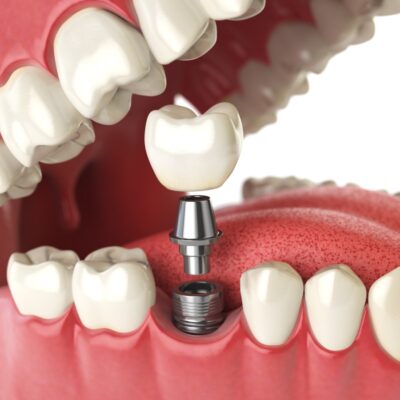One of the most predictable treatments for replacing missing teeth are dental implants. Dental implants are surgical-grade titanium screws placed into the jaw underneath the gums used to support a permanent replacement tooth. A crown, or replacement tooth, screws into the implant for a long-lasting and natural looking stability. Many dentists and patients prefer dental implants because they offer similar function as natural teeth and they help prevent further bone loss at the surgical site. Dental implants may be used to replace single missing or damaged teeth or to replace multiple missing teeth.
Did you know…
The American Academy of Implant Dentistry reports that 3 million people currently have dental implants – a number that is rapidly growing by about 500,000 per year. Modern titanium implants were first developed in the 1950’s, but archeologists have determined that ancient Egyptians and Mayans were the first cultures to implant artificial teeth.
Frequently Asked Questions
Are dental implants right for me?
You may qualify for dental implants if you have missing, broken, or severely decayed teeth and are in relatively good overall health. The only way of determining your eligibility for implants is to consult with your dentist or specialist to identify whether you have adequate bone support and healthy gums that will support a dental implant.
What should I expect if my dentist and I decide dental implants are right for me?
The placement of dental implants is a multi-step process that typically takes between 3-6 months to complete. It begins with a surgical procedure during which a titanium implant is placed where a previous natural tooth root once was. The gums are sutured shut over the implant where it will stay for several months while it heals and begins fusing with the surrounding bone. Due to the nature of implant placement and its average procedure time of between 1 and 2 hours, you’ll be sedated and/or anesthetized for the duration of the treatment. At the conclusion of the healing period, you’ll return to your general dentist for the placement of the permanent crown.
What type of post-treatment care will I require?
It is normal to experience some discomfort, including bruising and inflammation following a dental implant procedure. However, inflammation and pain may be managed with over-the-counter medications or other prescriptions from your doctor. You may be asked to eat only soft foods for approximately 2 weeks until the surgical site heals.
What about implant dentures?
Approximately 30 million people live with no natural teeth in one or both jaws. Normally, traditional dentures are made to fit over the supporting bone and gums, making them removable and easy to clean. However, for those who wish for a more permanent solution and more stability, there are various implant-supported denture options. Implants help keep the dentures stable in the mouth and play a role in helping preserve natural jaw bone. Implant-supported dentures can be removable with snap attachments or fixed with permanent screws. It’s important to consult with us and the specialist we coordinate with in order to find out what treatment options you have.
Call Downtown Dental today at 765.345.8284 to discuss your implant options.

